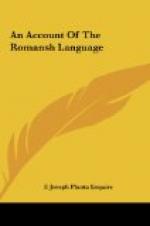[Footnote M: Liv. lib. v. c. 33.]
[Footnote N: Sprech. p. 214. Mer. l. c.]
[Footnote O: En Code Ino, perhaps the vulgar Roman phrase expressing In Capite Oeni. There are other etymologies, but all equally uncertain.]
[Footnote P: Sprech. p. 10.]
[Footnote Q: Lavin (Lavinium), Sus (Susa), Zernetz (Cerneto), Ardetz (Ardea), &c.]
[Footnote R: Sprech. p. 10.]
[Footnote S: A parallel instance of the formation of a language by Roman colonies is the idiom of Moldavia; which, according to Prince Cantemir’s account of that country, has still many traces of its Latin origin, and which, though engrafted upon the Dacian, and since upon the Sclavonian dialects of the Celtic, may still be considered as a sister language to that I am, here treating of.]
[Footnote T: Videre Rhaeti bella sub Alpibus Drusum gerentem et Vindelici. HOR. lib. 4. Od. iv. ------------- immanesque Rhaetos Auspiciis repulit secundis. Ibid. Od. xiv. Fundat ab extremo flavos aquilone Suevos Albis, et indomitum Rheni Caput. Luc. lib. ii. 52. ------------- Rhenumque minacem Cornibus infractis. CLAUD. Laud. Stilich. lib. i. 220.]
[Footnote U: Horten. in Lucan, p. 163. edit. 1578. fol.]
[Footnote V: Sprech. p. 18. &c.]
[Footnote W: Strabo, lib. IV, sub. fin. Cluver. Ital. vet. lib. I. c. 16.]
[Footnote X: Julius Mons, Scheuchzer Iter. Alp. p. 114.]
[Footnote Y:
Rhaetica nunc praebent Thraciaque arma metum.
OVID.
Trist.
lib. ii. 226. Devota morti pectora liberae.
HOR.
4. lib. Od. xiv.]
[Footnote Z: Sprech. p. 52-55.]
[Footnote AA: Sprech. p. 58.]
[Footnote AB: This privilege has at times been waved; but never without some plausible pretence, and a formal rescript acknowledging the exclusive right.]
[Footnote AC: The League Cadea, or of the House of God, so called from the cathedral of the bishopric of Coire, which is situated in its capital.]
[Footnote AD: Canitie griseoque amictu venerandi.—Memores adhuc antiquae libertatis. Sprech. p. 189.]
[Footnote AE: The following barbarous distich is sometimes inscribed on the arms of the three leagues. Foedera sunt cana, cana fides, cana libertas: Haec tria sub uno continentur corpore Rhaeto.]
[Footnote AF: See Dr. Percy’s preface to his translation of Mallet’s Northern Antiquities, p. xxii. where this question is more amply discussed.]
[Footnote AG: Conf. Mem. des Inscrip. tom. xxiv. p. 608.]
[Footnote AH: Bonamy, v. Mem. des Inscrip. l. c.]
[Footnote AI: Tapferda, Trapferkeit, Bravery; Narda, Narheit, Folly; Klinot, Kleinod, a Jewel; Graf, Graf, a Count; Baur, Baur, a Peasant, &c.]




